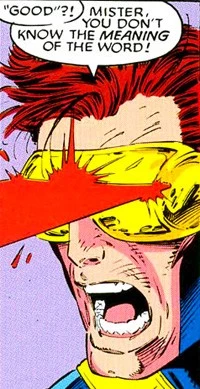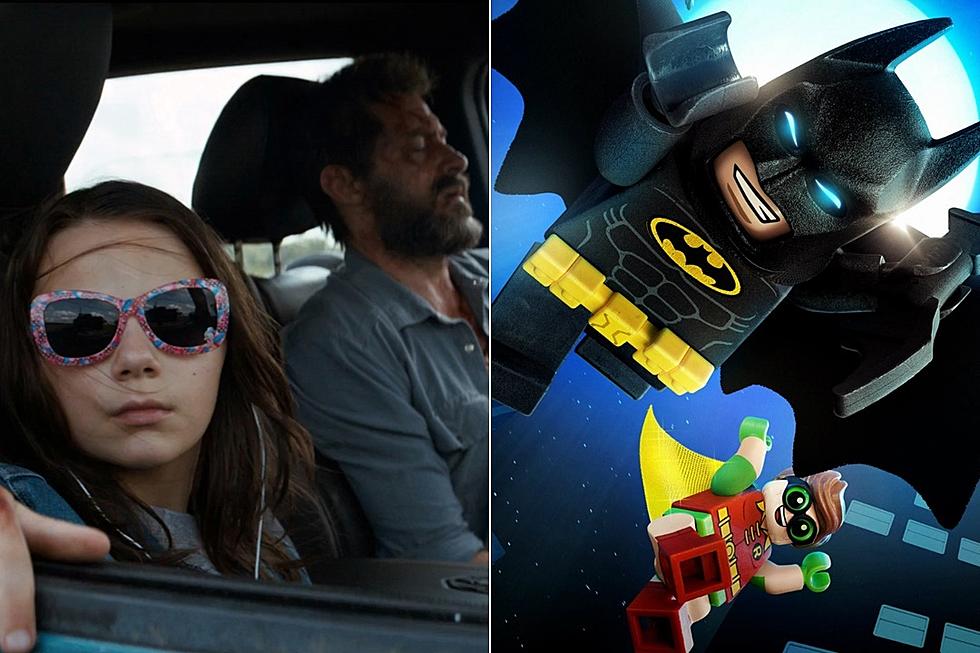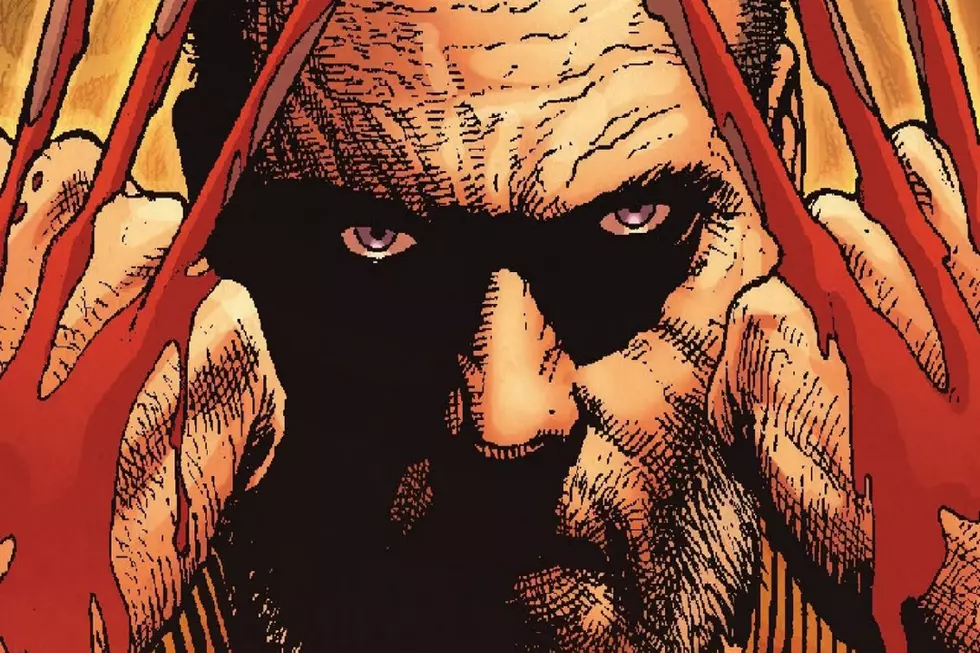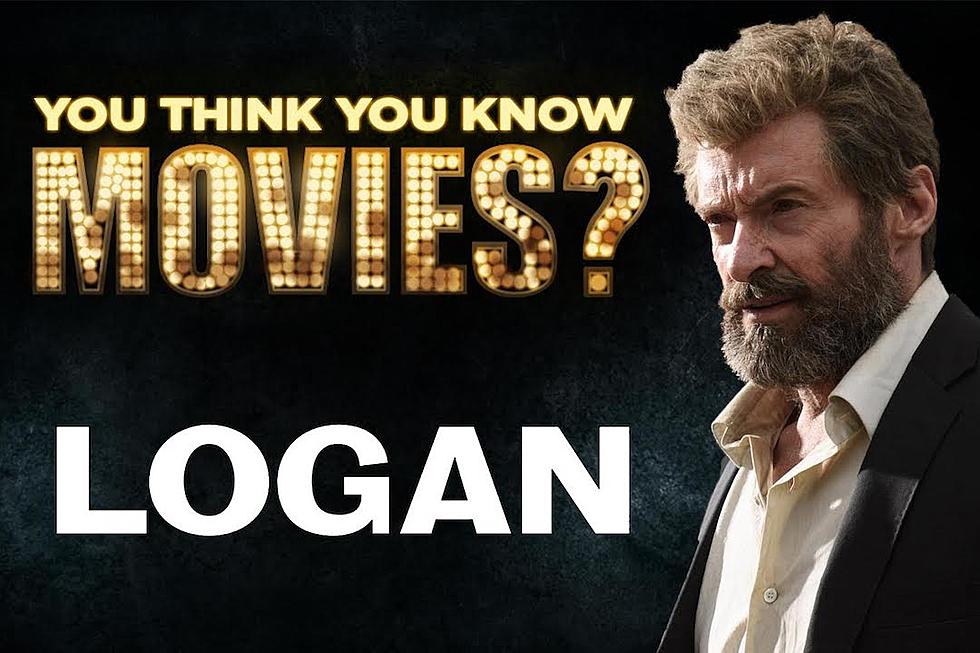
Ask Chris #142: The Case Against Cyclops
Over a lifetime of reading comics, Senior Writer Chris Sims has developed an inexhaustible arsenal of facts and opinions. That's why, each and every week, we turn to you to put his comics culture knowledge to the test as he responds to your reader questions!

Q: Why all the hate for Cyclops? -- @chrisfarnsworth
A: Because Cyclops is basically terrible.
Yeah, I know, that's exactly what I said about Aquaman. If I use it three times, though, it officially becomes a running gag, and that'll come in handy the next time someone asks about Hawkman. I don't know if it's like this for everyone, but in my circle of friends, Cyclops is one of the most divisive, polarizing characters in the history of comics. I know otherwise rational people who insist that he's not just the best X-Man, but one of the best characters ever. And they stick by this statement, even when you remind them that Cyclops is not Wolverine and therefore does not fight ninjas, like, all the time. It's weird.
I don't know if it's like this for everyone, but in my circle of friends, Cyclops is one of the most divisive, polarizing characters in the history of comics. I know otherwise rational people who insist that he's not just the best X-Man, but one of the best characters ever. And they stick by this statement, even when you remind them that Cyclops is not Wolverine and therefore does not fight ninjas, like, all the time. It's weird.
Really, though, I can kind of see where they're coming from. If there's one thing that should be evident from this column, it's that I have a pretty hard time imagining opinions that aren't my own, but if I try really, really hard, I can see the appeal that Cyclops could have to a certain kind of personality. At the very least, he makes for a pretty interesting portrait of repression and duty: This is a guy who has to constantly keep himself in check because he can't so much as look at something without destroying it. To make matters worse, this is a burden that was dropped on him at a young age when his dad went off to space to become a badass mustachioed space pirate who starjammed a catgirl on a nightly basis (which I think is the exact opposite of being repressed), leaving Cyclops to get recruited by a weird old mind-reader (who, now that I think of it, also had an outer-space girlfriend) into a secret paramilitary organization based around the idea that humanity at large was actively trying to kill him and commit full-on genocide against his entire race, which turned out to be correct.
The X-Men are pretty intense, y'all.
When you look at him as a character who's been under that level of pressure since he was a teenager -- both externally in his role as the leader of the X-Men, and internally with the metaphor that comes from his powers -- it's easy to see Cyclops as the patron saint of people who feel the same kind of stress and opt to power through, fueled by the knowledge that what they're doing is both Right and Necessary. My pal (and former Dark Horse editor) Rachel Edidin, probably the biggest Cyclops fan I know, summed it up in an interesting post about why she's so drawn to the character:
He leads the X-Men -- not because he has any illusions about his skills or likability, but because someone has to. He puts himself in the line of fire because that's what being responsible for people means, and makes decisions that'll get him hated because they're decisions that have to be made. He f**ks up and f**ks up and f**ks up, and apologizes, and rebuilds, and learns, and grits his teeth and dives back in to f**k up some more.
He does this in hopes of building a world that will, realistically, have no place for him; leading or working under people whose expectations for him are flat-out impossible to meet and who hold him accountable every time he fails to live up to them.
And he keeps doing it.
And doing it.
And doing it.
I read that, and then thought about how I often find myself drawn to characters defined by their determination and self-reliance, and then I told Rachel that if she loved Cyclops so much, maybe she should go marry him and have a bunch of time-traveling babies with glowing eyes and stupid powers. Then she responded with this:

This is how most of my conversations about Cyclops go. You can see how this is a problem. But the thing about Cyclops is that even if I agree with all that and see where he's coming from, he's still not Spider-Man.
That might not sound fair. I mean, there are plenty of comic book characters who aren't Spider-Man, and at least seven or eight of them are well worth reading about. But for me, Spider-Man deals with those same ideas of perseverance under pressure in a much more interesting and elegant way, and his take on repression -- that the mask gives him a false confidence that becomes real over time, giving him strength even despite a core that's riddled with insecurities -- is something I have a much easier time relating to.
That's not to say that Cyclops is intrinsically bad, or that Spider-Man has a monopoly on struggling against impossible odds and haunting regrets in his personal life. That's the classic Marvel formula for high drama superheroics that's been kicking around ever since Ben Grimm watched his best friend get superpowers awesome enough that he called himself "Mr. Fantastic," while he himself was trapped in a powerful but misshapen body that looked less like a person and more like some thing. He was the prototype of the Marvel Superhero, and while Spider-Man perfected that formula, it's worth noting that the X-Men were really the first attempt to apply this dynamic to an entire group, classifying the whole darn team as a bunch of freakish outsiders.
Individually, though, the characters didn't have that element for quite a while. It was years before Jean Grey's powers would occasionally turn her into a space monster that ate planets, and Beast would mutate himself into a form that better fit his name rather than just being a husky bro with big hands and feet, and Angel and Iceman would have to admit that they were in fact part of the Champions. The only one of the original five who did have that obvious, debilitating Marvel Curse was Cyclops, and even if it was just in the form of a pair of doofy glasses that he had to wear, that gives him a deeper understanding of what it means to be a mutant. It makes him a natural as a leader, and explains why he'd be so dedicated to the cause.
But again, that's part of the problem for me. I've mentioned before that for better or worse, what defines Cyclops is that he's the X-Man who's an X-Man. It's all he has, it's what he does, it's the thing he puts ahead of everything else, and that can go either way in terms of how he comes off.
On the one hand, you have those moments where that dedication makes him step up and take charge when nobody else will, because it is Time To Get Things Done, and those are the scenes where Cyclops is great. The scene that Chad Bowers, my writing partner, always uses to back up his assertion that Cyclops is the best X-Man is one of those, from the Proteus story in Uncanny X-Men #127.
If you've never gone back and read that one, it's awesome. Proteus, the son of Moira MacTaggert, has the power to alter reality itself, and as you might expect, the X-Men's first encounter with him ends with the team getting a pretty brutal defeat. Wolverine takes it the worst -- for a guy who doesn't trust anyone or anything other than his own enhanced senses, having those senses be completely unable to interpret the world around him has left him freaked right the hell out. There's actually a panel where he's huddled up, shaking and stuttering, refusing to talk about it, and that in itself is pretty remarkable, since it's an artifact from the time before Wolverine was the Ultimate King Badass of the Marvel Universe.
Cyclops decides that he needs to get everyone back into fighting shape, so he decides that the best course of action would be to throw a cup of hot coffee into Wolverine's face and pick a fistfight.

Over the next few pages, Cyclops just cold beats down the entire rest of the team by himself, making himself a target in order to remind them of who they are and what they can do, and it's awesome. It's one of the greatest expressions of that core of his character, that he knows how unstoppable he (and the team) can be if they can allow themselves to let go of their fear, the way he can finally let go himself when it's time to get in a fight.
On the other hand, that kind of lockstep droning makes him an authority figure for the other characters to rebel against, something that automatically makes him less interesting. That was pretty much Cyclops's entire deal on the '90s cartoon (and the live-action movies, now that I think of it), standing around being the sensible TV newscast voice of reason that could contrast with Wolverine growling death threats and blatant attempts at girlfriend-stealing.
There's a defining moment of this one, too -- by the same writer, even -- and running across this panel when I was just starting to get really into the X-Men basically destroyed Cyclops as a character for me:

I remember reading through X-Men #1 and just stopping dead when I hit that panel. Up to that point, I'd been super into what was going on, the training exercise that pit the teams of X-Men against each other was extremely compelling, and a great way to introduce the cast and their powers. Also, Gambit kissed a robot and then it exploded in his face, and if I could change one thing about the '90s, it would be making that a recurring theme. Gambit would be the dude who made out with exploding robots all the time, and we'd all be better for it.
It's really neat, engaging action (for a ten-year-old, at least), but then here comes Teacher's Pet to ruin our fun. Yeah, Cyclops. He knows how dangerous his claws are. They are literally attached to his arms, genius, and considering he's the best there is at what he does, I think it's safe to say that he understands how to stab people when he wants to. What are you the best at? Memorizing the X-Mansion chore chart? Get the f**k out of here.
From that moment on, that's the image of Cyclops that I have in my head whenever he shows up: The guy who frowns at all the cool characters and tries to stop them from doing awesome things because the Professor says and we have a responsibility and you can't just stab everyone and not now Jean I have to program the Danger Room. And he kind of has to be that way, because there has to be someone providing the core of the team so that everyone else can orbit around it and push away; Wolverine wouldn't be Wolverine if he didn't have Cyclops to rebel against. I'd just rather read about the rebelling than the guy who tells him hey stop that, it's after 10 and we have a noise policy here.
Also, jeez, look at that panel. That is a lot of words. If I'd been a little older when I read this, I probably would've come away from it thinking that I didn't like Chris Claremont's '90s dialogue, but I was still young enough to just assume that Cyclops talked like a massive tool. Fortunately, that's an assumption that has yet to be proven wrong.
That's all we have for this week, but if you've got a question you'd like to see Chris tackle in a future column, just send it to @theisb on Twitter with the hashtag #AskChris, or send an email to chris@comicsalliance.com with [Ask Chris] in the subject line!
More From ComicsAlliance









